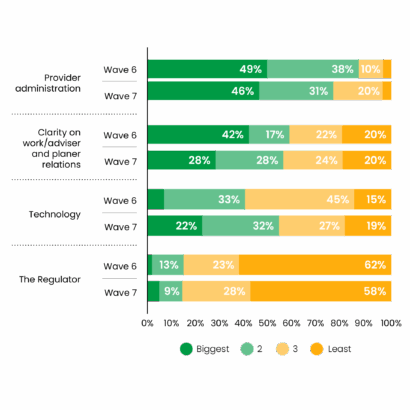A key finding of the lang cat’s annual State of the Advice Nation (SOTAN) report is paraplanners’ view of the profession as a career path in its own right. Some 51% of paraplanner respondents said they see their future within paraplanning, rather than 24% who said they would move into giving financial advice. This indicates a strong desire for recognition and career development within their current roles., the report says
When asked about remuneration, however, the majority (75%) said they felt that they are often renumerated unfairly and don’t share in the wider success of the firm.
Half of paraplanners (49%) said they feel their role is hampered by provider administration, and state this is the biggest inhibitor of their day-to-day work. This was closely followed (42%) by clarity on work and their relationship with advisers.
On the upside, the report said, paraplanners remain bullish about the adoption of artificial intelligence (AI), with most confident that it will present opportunities rather than a threat. Similarly, 39% believe the biggest impact on their profession will be of tech as an enabler that delivers benefits like slicker processes.
On another positive note, paraplanners and business owners largely agree on the essential skills that paraplanners bring to the table, such as technical competency, report writing, and research skills. However, 44% of paraplanners also emphasise their communication skills, and around 50% believe they could harness these more to be more client facing.
In terms of their daily tasks, while the report’s findings show paraplanners play a critical role in suitability report construction, cashflow modelling, and the wider client review process, their involvement in Centralised Investment Propositions (CIPs) and Centralised Retirement Propositions (CRPs) varies significantly across firms.
Referring tp paraplanners as the “unsung heroes of the advice sector”, Steven Nelson, Insights director at the lang cat said, “what’s clear is the passion for paraplanning as a career runs deep. Our research showed that around 70% of respondents believe there should be a dedicated Chartered pathway. Alongside the fact that half feel they could take their communication skills even further and play a more client-facing role. All signs of a confident, ambitious profession that knows it’s worth and is ready to grow.
“The issue of renumeration and the dissatisfaction surrounding it was a real mic drop moment for us and hopefully provides some real food for thought for the wider industry that is so dependent on paraplanners’ skills and expertise.”
Main image: ian-schneider-TamMbr4okv4-unsplash

Paraplanning as a career

Hampered by administration






























